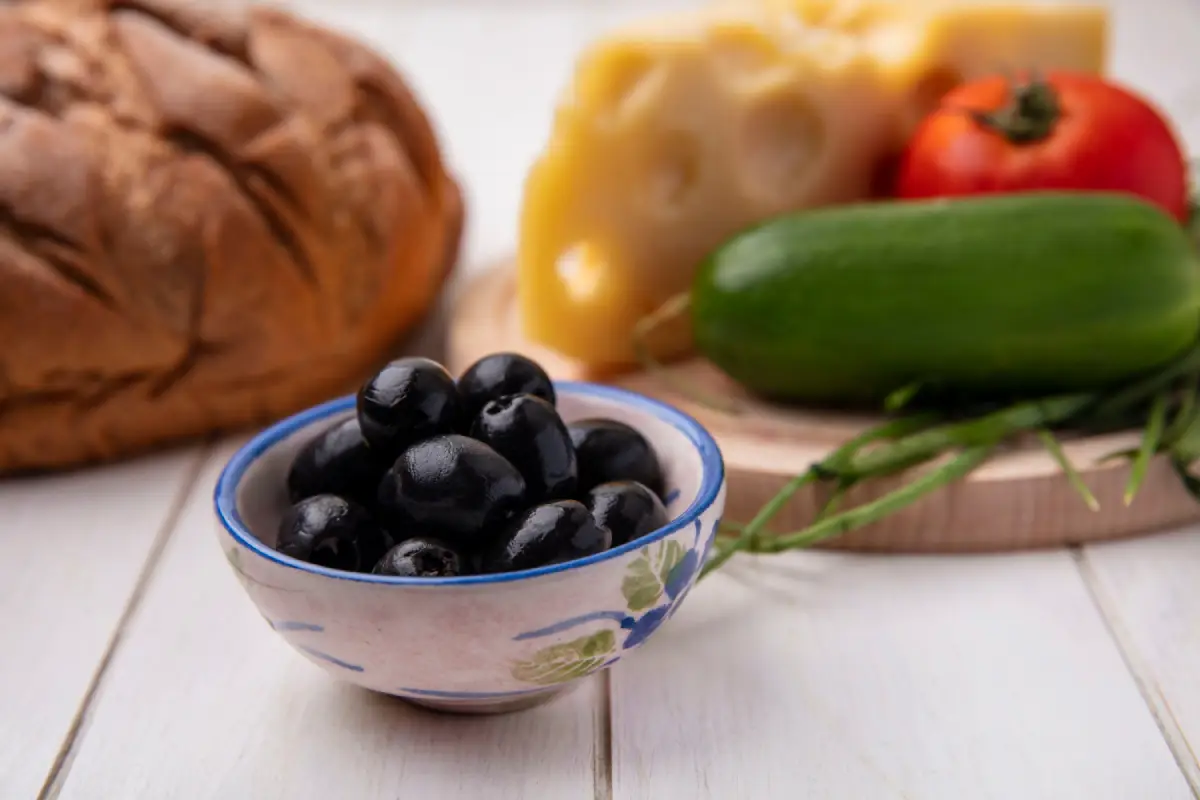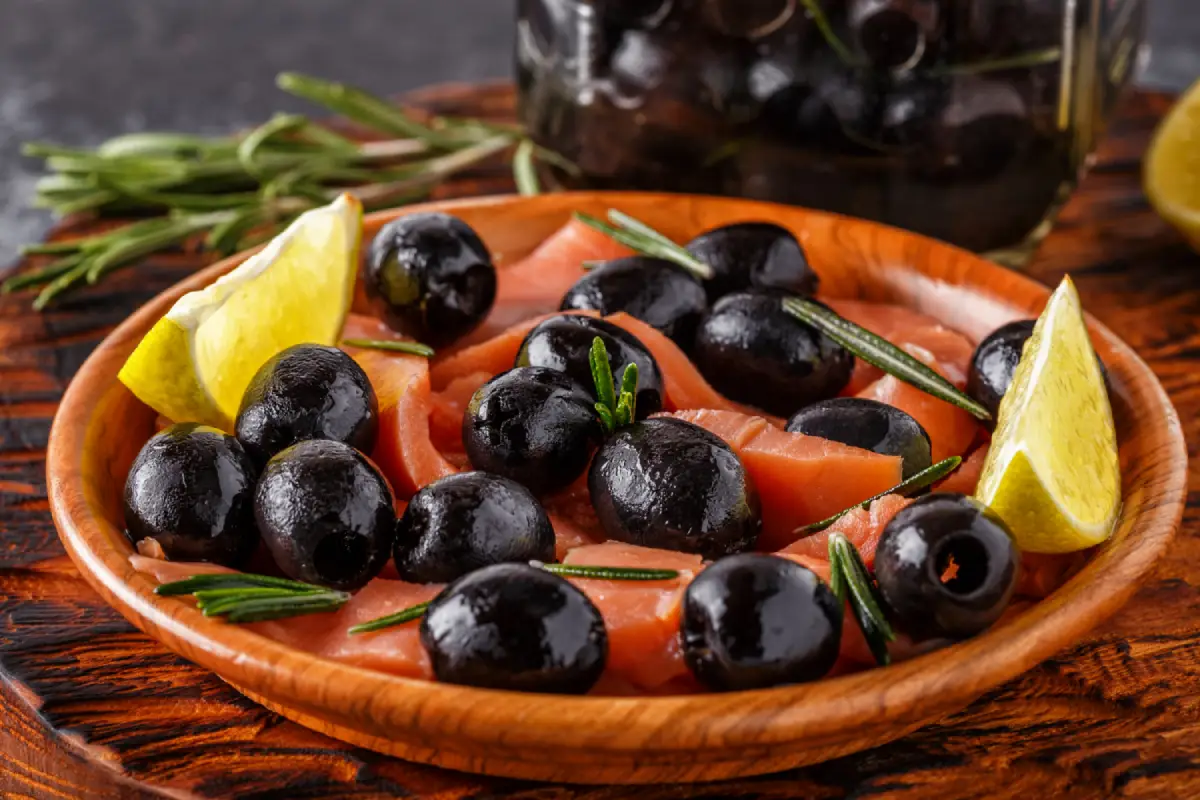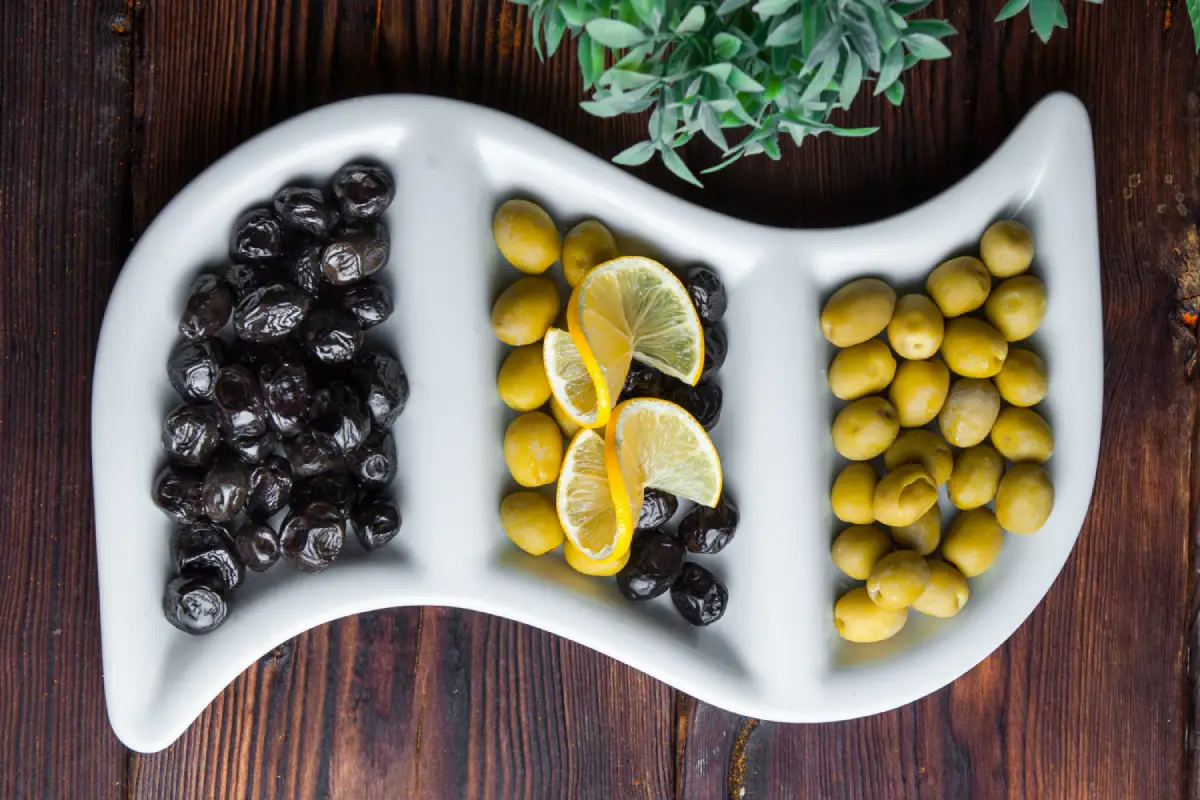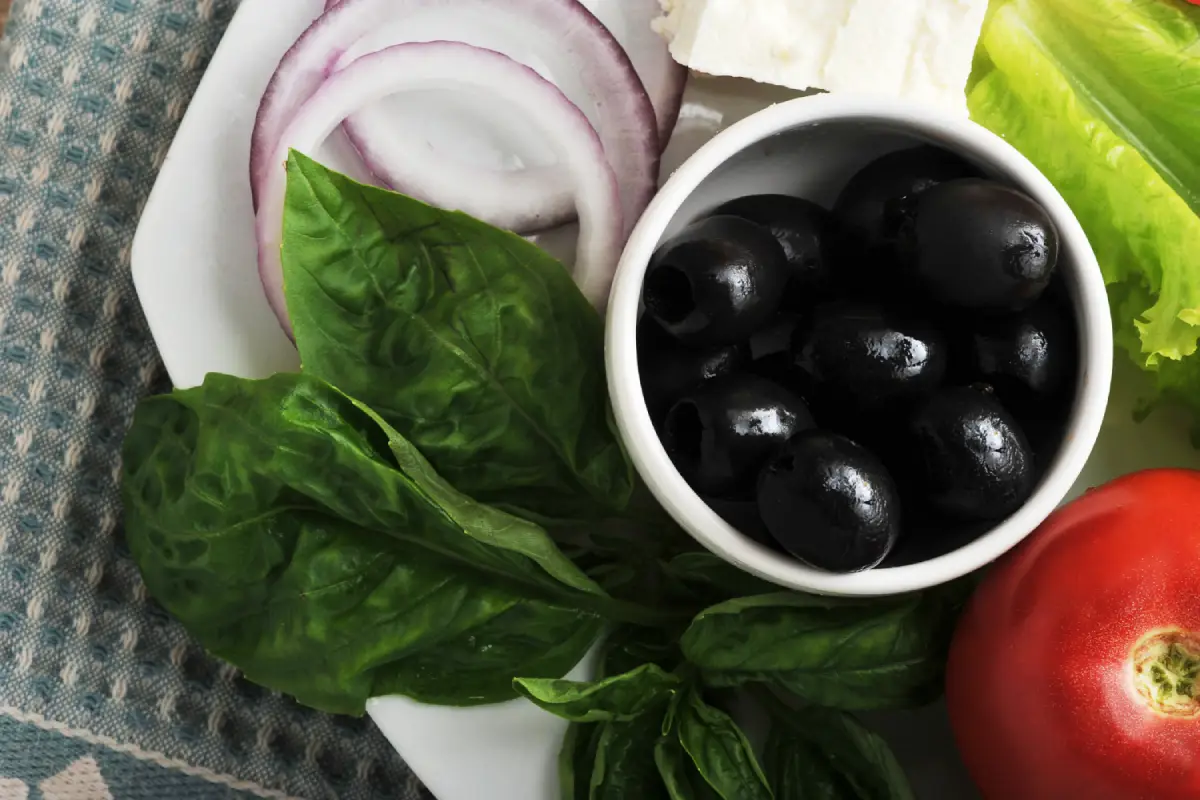Welcome to the intriguing world of black olives! Often spotted in salads, pizzas, and Mediterranean dishes, these little fruits are more than just a tasty addition to meals. In this guide, we’re diving into a question many health-conscious food lovers ask: Are black olives good for you?
Black olives are not just a culinary delight; they hold a place of honor in many cultures and cuisines. But beyond their rich, savory flavor, there’s a world of nutritional benefits waiting to be explored. We’ll unpack the nutritional content of dark olives, understand their health impacts, and even see how they stack up against their green siblings.
Whether you’re a food enthusiast, a health buff, or just curious, this journey through the world of dark olives promises to be enlightening. So, let’s set off to discover the truth behind these little black gems. Are they just a flavorful treat, or is there more to them than meets the eye? Join us as we find out!
Nutritional Profile
Black olives are more than a tasty addition to meals; they offer numerous health benefits. Learn more about the nutritional value of black olives. Let’s explore how these small fruits can make a big impact on your well-being.
- Heart Health: Thanks to their monounsaturated fats, particularly oleic acid, dark olives are heart-friendly. They help manage cholesterol levels and reduce the risk of heart disease.
- Antioxidant Power: The antioxidants in olives, like vitamin E, fight oxidative stress. This reduces the risk of chronic diseases and helps slow down the aging process.
- Skin and Eye Health: Vitamins A and E in dark olives are great for maintaining healthy skin and good vision.
- Improved Digestion: While they’re not high in fiber, the fiber they do contain aids in digestion and supports gut health.
- Bone Health: The calcium in olives contributes to strong bones, reducing the risk of osteoporosis.
- Weight Management: Low in calories, dark olives can be a part of a weight management diet without sacrificing flavor.
Remember, while dark olives offer these health benefits, it’s important to consume them in moderation due to their sodium content.
In summary, incorporating dark olives into your diet can support heart health, provide antioxidant benefits, and contribute to overall well-being.
Incorporating Black Olives into Your Diet
Adding black olives to your diet can be both delicious and beneficial for your health. Here are some creative and easy ways to enjoy them:
- Salads: Slice or chop dark olives and add them to your salads for a burst of flavor and added nutrition.
- Pizzas and Pastas: Top your pizzas with the olives or mix them into pasta dishes for a Mediterranean touch.
- Sandwiches and Wraps: Incorporate the olives into your sandwiches and wraps for an extra layer of taste and texture.
- Tapenade: Make a tapenade by blending the olives with olive oil, garlic, and capers. It’s a perfect spread for bread or a dip for veggies.
- Snacking: Enjoy dark olives as a healthy snack. Discover the health benefits of olive oil. They can be a great alternative to processed snack foods.
- Cooking with Olive Oil: Use olive oil, extracted from black olives, for cooking and dressing salads. It’s a healthier fat option.
- Garnishes: Use the olives as garnishes to add visual appeal and flavor to dishes.
Remember, while dark olives are nutritious, they are also high in sodium. Enjoy them in moderation, especially if you’re watching your salt intake.
By incorporating black olives into your diet, you can enjoy their rich flavor while reaping their health benefits. They are a versatile ingredient that can enhance a variety of dishes.
Black vs. Green Olives: A Nutritional Comparison
When it comes to olives, color matters – but how do black and green olives differ nutritionally? Let’s compare these two olive varieties.
- Ripeness: The primary difference is ripeness. Green olives are picked before they are fully ripe, while black olives are picked when ripe. This impacts their flavor and texture.
- Taste and Texture: Green olives are firmer and often have a more bitter taste. Dark olives are softer and usually have a milder, richer flavor.
- Nutritional Content: Both green and black olives contain healthy fats, but the type and amount can vary. Green olives typically have a higher oleic acid content.
- Antioxidants: While both have antioxidants, the types and levels differ due to their ripeness. Black olives usually have higher levels of certain antioxidants like hydroxytyrosol.
- Calories and Sodium: Green olives generally have fewer calories and less sodium than dark olives. However, this can vary based on preparation and curing methods.
- Vitamins and Minerals: Both types offer vitamins and minerals, but the amounts can differ. For instance, dark olives might have more iron and copper.
In essence, both black and green olives are nutritious, but their differences in ripeness lead to variations in taste, texture, and nutritional content. Your choice between them can depend on personal taste preferences and specific dietary needs.
Daily Consumption Guidelines
How many black olives can you enjoy each day without overdoing it? It’s important to consume them in moderation, especially considering their sodium content. Let’s look at some guidelines:
- Moderation is Key: While olives offer health benefits, they should be consumed in moderation due to their high sodium levels. Overconsumption can lead to elevated blood pressure and other health issues.
- Recommended Serving Size: A typical serving size of dark olives is about 4-5 large olives or 8-10 small ones. This can vary based on individual dietary needs and overall health.
- Balance with Other Foods: Incorporate dark olives into a balanced diet. Ensure you’re also consuming a variety of fruits, vegetables, grains, and proteins.
- Watch for Sodium: If you’re on a low-sodium diet, be particularly mindful of your black olive intake. Look for low-sodium varieties if available.
- Listen to Your Body: Everyone’s dietary needs are different. Pay attention to how your body responds to dark olives and adjust your intake accordingly.
Remember, while black olives can be a healthy addition to your diet, they’re best enjoyed as part of a varied and balanced diet. Keeping an eye on portion sizes will help you reap the benefits without overindulging.
Are There Any Risks to Eating Black Olives?
While black olives are nutritious and offer various health benefits, it’s important to be aware of potential risks associated with their consumption:
- High Sodium Content: One of the primary concerns with these olives is their high sodium content, due to the brining process. Excessive sodium intake can lead to high blood pressure and other cardiovascular issues.
- Allergies and Sensitivities: Some people may have allergies or sensitivities to olives or substances used in their processing. It’s rare, but worth being mindful of if you experience unusual symptoms.
- Caloric Density: While they are low in calories, olives are dense in fats, and eating them in large quantities can lead to weight gain.
- Quality and Processing: The method of processing and preserving olives can affect their nutritional value. Some methods may involve additives or chemicals that some individuals might want to avoid.
- Pregnancy Considerations: Pregnant women should be cautious with olives due to their high sodium content and potential for containing additives.
- Interaction with Medications: If you’re on medication, especially for blood pressure, consult your doctor about your olive intake, as high sodium foods can impact the effectiveness of certain drugs.
In summary, while dark olives are a healthy addition to most diets, it’s important to consume them in moderation, be aware of personal sensitivities, and choose high-quality, minimally processed options.
Myths and Misconceptions About Black Olives
There are several myths and misconceptions surrounding black olives. Let’s set the record straight on some of these common misunderstandings.
Myth: Black Olives are Unhealthy Due to High Fat Content
Fact: The fats in dark olives are primarily healthy monounsaturated fats, which are beneficial for heart health.
Myth: All Black Olives are Naturally Black
Fact: Some olives are picked green and then ripened artificially to turn black. Natural black olives are those that have fully ripened on the tree.
Myth: The Darker the Olive, the Higher the Nutrient Content
Fact: The color of the olive doesn’t necessarily indicate its nutrient content. Nutritional value depends on the olive variety, ripeness, and processing method.
Myth: Black Olives Have No Sugar
Fact: While low in sugar, dark olives contain small amounts of natural sugars.
Myth: Eating Black Olives Will Lead to Weight Gain
Fact: Dark olives can be part of a weight management diet due to their healthy fats and low-calorie content. However, moderation is key.
By understanding the facts about dark olives, you can better appreciate their role in a healthy, balanced diet and enjoy their benefits without misconceptions.
Frequently Asked Questions
Here are answers to some commonly asked questions about black olives, providing further insights into their health implications and usage.
How many black olives can you eat a day?
A typical serving is about 4-5 large olives or 8-10 small ones. Remember, moderation is key due to their high sodium content.
What are the benefits of eating black olives?
Black olives are beneficial for heart health, provide antioxidants, support skin and eye health, aid in digestion, and contribute to bone strength. They are also useful for weight management due to their low calorie but high nutrient content.
Which is healthier: green or black olives?
Both black and green olives offer health benefits. The choice depends on your personal dietary needs and taste preferences. Black olives tend to have a higher antioxidant content, while green olives usually have less sodium and calories.
Are black olives a healthy snack?
Yes, black olives can be a healthy snack option. They’re rich in healthy fats and low in calories. However, due to their high sodium content, they should be consumed in moderation.
Conclusion
In our journey through the world of black olives, we’ve uncovered a wealth of information about these flavorful and nutritious fruits. From their rich nutritional profile, which includes healthy fats, antioxidants, and essential vitamins, to their myriad health benefits like supporting heart health and aiding in digestion, olives are indeed more than just a culinary delight.
We’ve also explored how they compare to green olives, debunked common myths, and provided practical tips on incorporating them into your diet in a healthy way. Remember, while they are a fantastic addition to many meals, it’s important to enjoy them in moderation due to their high sodium content.
Dark olives, with their deep color and rich taste, not only add a touch of Mediterranean flair to your dishes but also bring a host of health benefits. Whether as a snack, a salad ingredient, or a pizza topping, they are a versatile and healthful choice for those looking to enrich their diet. Read more about the Mediterranean diet.
We hope this guide has answered your question, “Are black olives good for you?” and given you new insights into how these small but mighty fruits can contribute to a healthier lifestyle. Enjoy the rich flavors and health benefits of black olives as part of your balanced diet!






